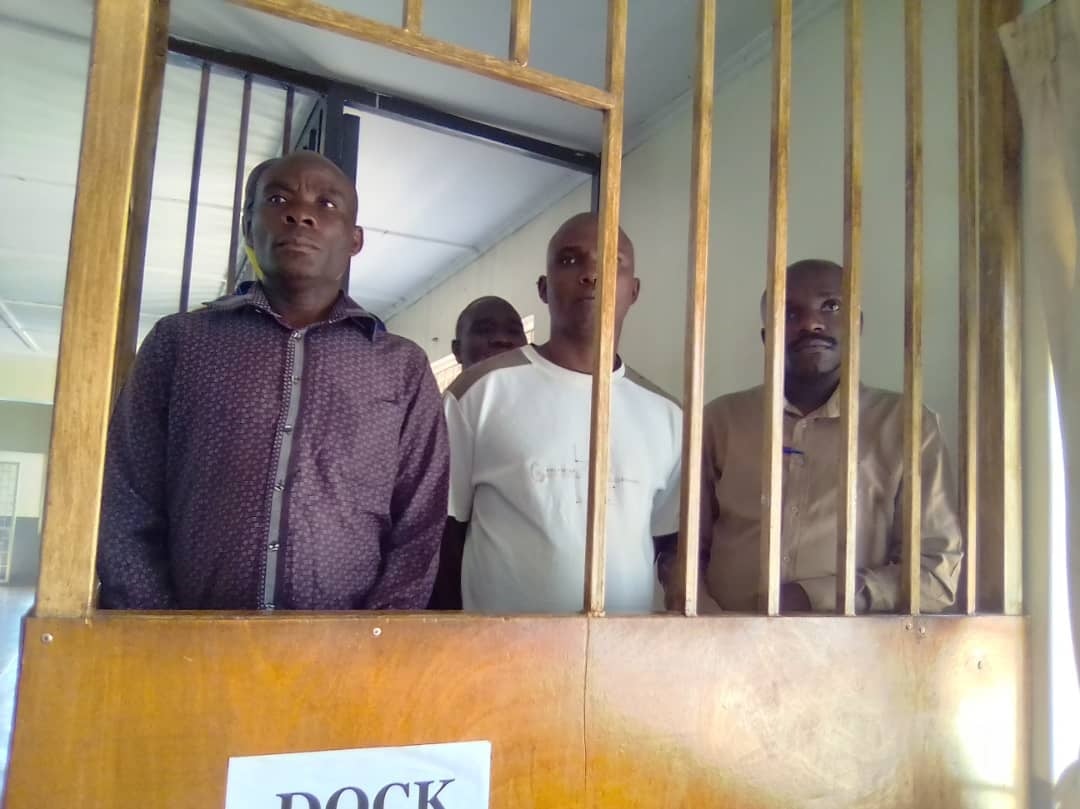Army appellate court quashes death sentence handed to two UPDF soldiers

The convicted UPDF soldiers in the dock at the army court on October 12, 2022. PHOTO/ JULIET KIGONGO
What you need to know:
- The soldiers were convicted of murder of seven civilians in Somalia where they were deployed for peace keeping
An army appellate court in Kampala has quashed a death sentence handed to two Uganda People’s Defence Forces (UPDF) soldiers who were convicted alongside three of their colleagues for killing seven civilians in Somalia where they had been deployed for peace keeping.
Captain Charles Asiimwe, Corporal Edison Bwambale had been sentenced to death after they were convicted of murder while Corporal Alexander Babu, Lance Corporal Phillip Ichumar and Private Kerere Tushemereirwe had each been handed a 39-year jail sentence by the army court presided over by the former chairman, Lt General Andrew Gutti.
However, being dissatisfied with the sentences, the convicts petitioned the army’s appellate court on grounds that the sentences were harsh.
After hearing the soldiers’ petition, the General Court Martial Appeal Court presided over by Justice Elly Turyamubona on Wednesday ruled that the death sentences handed to Asiimwe and Bwambale were harsh and excessive considering the circumstances under which the offences were committed.
Other members on the panel included; Brig Alex Ndyanabo, Lt Col Birugi, Maj John Bolobya Kalyango and Maj Dennis Katambuka.
“We have considered the circumstances under which this offence was committed, the fact that the appellants (soldiers) were operating in very difficult circumstances and there has been some attacks on the UPDF soldiers and indeed this court has taken judicial notice that some of our soldiers had lost their lives at the hands of Al-Shabab and their collaborators making it difficult to tell who an enemy is or not in such circumstances where enemies impose as innocent civilians,” Justice Turyamubona said.
According to court, an analysis and consideration of such factors would remove the case from those rarest of the rare cases which call for a death penalty.
“The trial court might have been influenced by the reaction or riots that followed the murder of the victims to impose the death sentence,” Justice Turyamubona added.
According to the court, a 20-year jail sentence for Capt Asiimwe and Cpl Bwambale was appropriate and when the eight months and 29 days they have spent detention are deducted, it means the two convicts will serve 19 years and three months in prison.
Court also found that a 16-year jail sentence was appropriate for Cpl Ichumar and Pte Tushemererwe who were simply following orders from their superiors at the time the offence was committed.
But this did not take away the liability of the offence given that all soldiers participated in committing the offence, according to the evidence produced before court.
“We find that the trial court found that the prosecution adduced sufficient evidence to prove all the ingredients of the offence of murder and we also find that the court properly evaluated the evidence in the case in respect of appellant 1,3,4 and 5 participated in the murder,” the court ruled.
However, court noted that prosecution witnesses did not implicate Corporal Babu for the civilians’ murder. Coro Babu who was reportedly not at the scene of murder at the time was called after the offence had been committed and asked to detonate the bombs which dismembered the victims’ bodies.
“There is no way you can charge a person with murder of a dead person. If the trial court had analysed the evidence properly, it would not have convicted appellant 2 of murder. The court erred in failing to evaluate this piece of evidence and erroneously convicted him. We quash the conviction and set aside the sentence imposed upon him and order his immediate release from custody unless held on other grounds,” the court ruled.
The soldiers were part of the African Union Mission in Somalia (Amisom).





